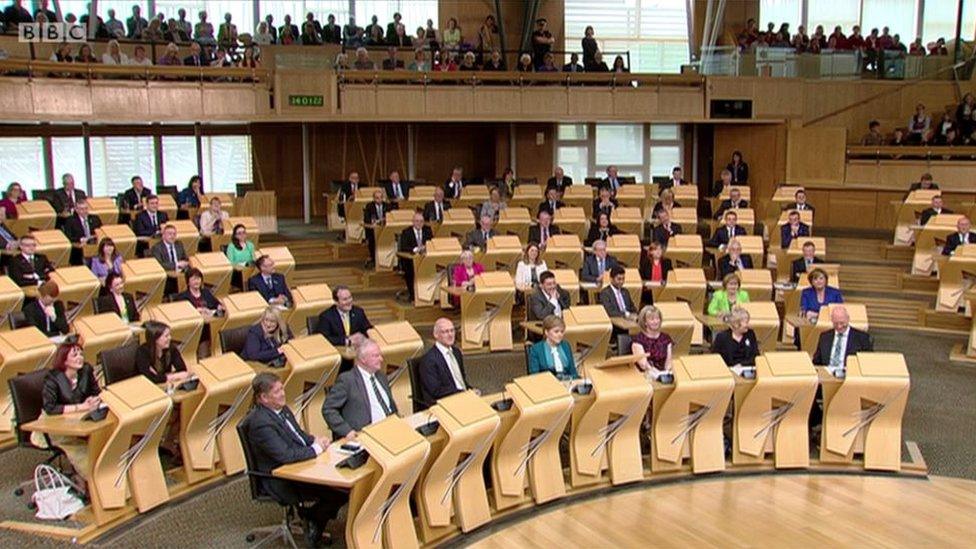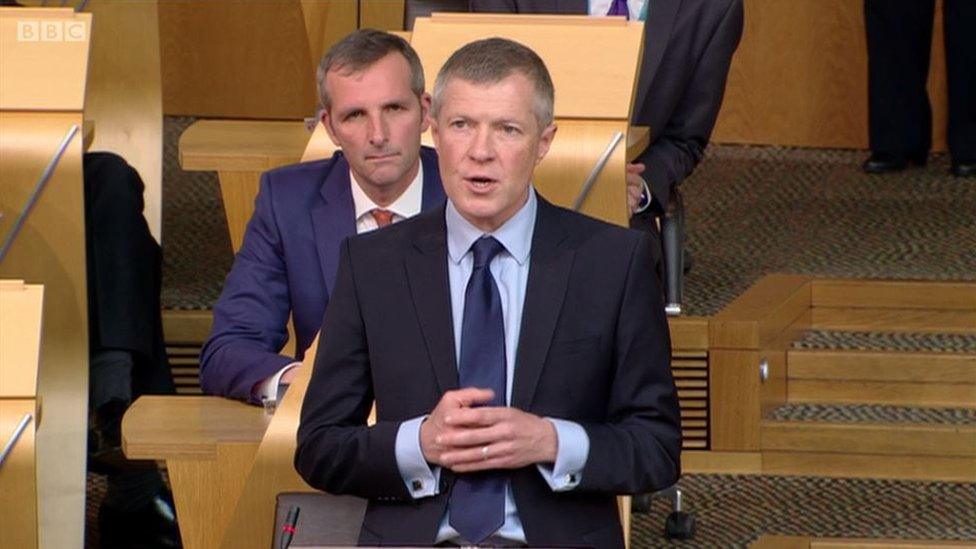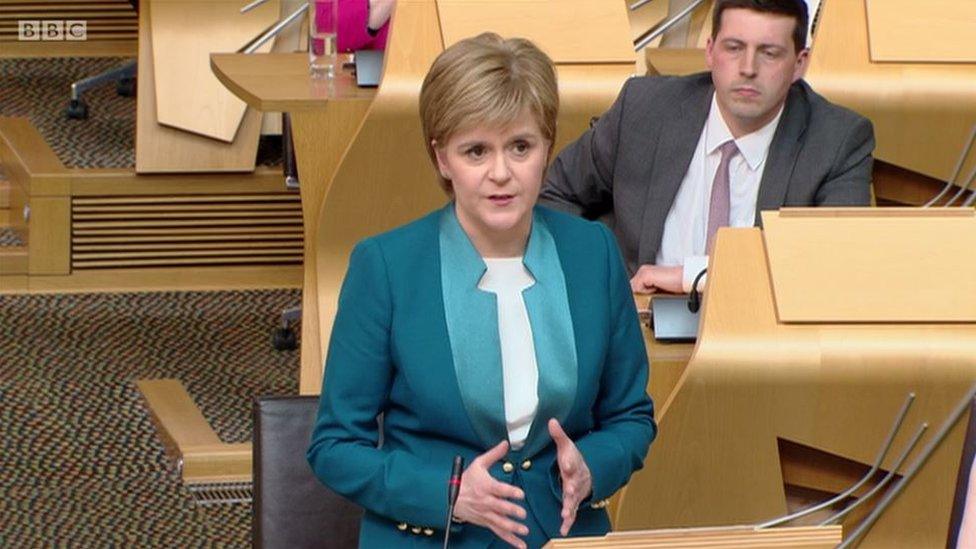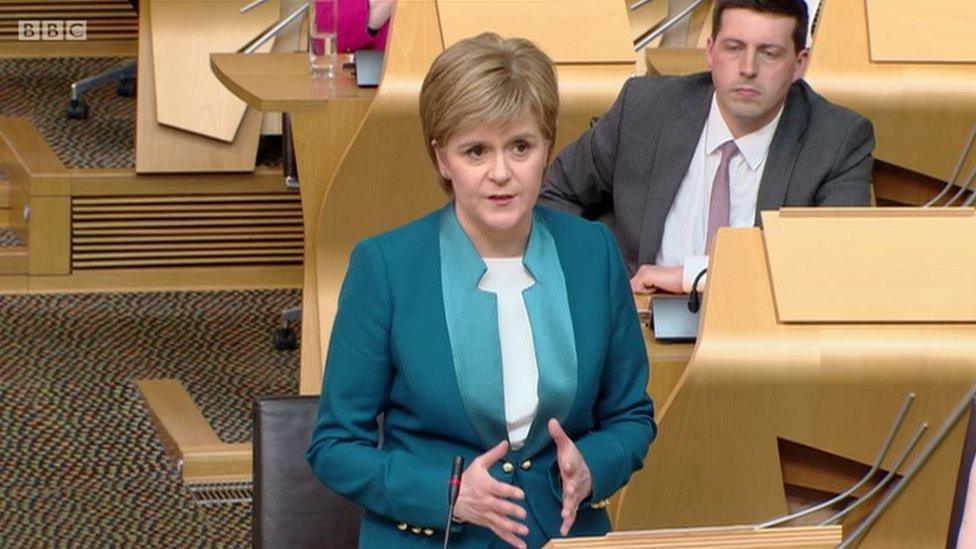Willie versus Nicola: Holyrood chooses its first minister
- Published

MSPs gathered to choose a nominee for first minister
Always glad to welcome a listener. Or two. Willie Rennie confided to parliament that he had been listening to the wireless this morning in the company of his twelve year old son.
The subject? My report informing an astonished nation that Mr Rennie planned to stand for the post of first minister.
The response of Rennie Jr? "Aw dad, you're not, are you?" Rennie père informed his offspring, no doubt with a doleful expression, that such was indeed his intention.
Ah, I hear you say, perhaps he was listening to another station entirely. Behave yourself, say I. Mr Rennie - already renowned as a fine judge of pigs - is far too erudite and intelligent to listen to anything but BBC Radio Scotland.
Young Rennie need not have worried. His dad - or paw, as he would probably say to Prince Charles - did not seriously expect to win.
His objective, he declared, was to remind Nicola Sturgeon and others that "we are all minorities now". Some, however, are decidedly more minor than others, as Ms Sturgeon plainly implied in her own speech.

Willie Rennie, despite the protests of his son, threw his hat into the ring for first minister
It was a good day for Parliament. Ken Macintosh controlled matters deftly from the chair. The votes passed without blunder - which is far from a universal occurrence. And, as Patrick Harvie reminded the chamber, there was an absence of the bogus points of order which had interrupted the comparable occasion in 1999.
There was also humour. Drollery from Mr Rennie. Dry wit from Nicola Sturgeon. All in keeping, all in order, all in moderation.
And then it got serious.
Ruth Davidson of the Conservatives didn't stand for the post of First Minister. Would have been a bit tricky given that her entire election pitch was predicated upon her seeking to be Ms Sturgeon's principal opponent. Not seeking to replace her.
But still the Tory leader offered trenchant analysis. The SNP, she implied, had over-used executive power during their period of majority. Parliament was sovereign again.
Hunt for consensus
Labour's Kezia Dugdale sought to depict a conundrum for Ms Sturgeon. The newly returned FM could, she said, look left or right for chums. The plain implication being that she should look left - a point made with still greater vigour by Mr Harvie.
For his part, Mr Rennie acknowledged the outcome of the election by urging all parties to "hunt" for agreement and consensus.

Nicola Sturgeon underlined her political position while making her acceptance speech
Nicola Sturgeon's acceptance speech was well balanced and judged. Humility mingled with the pride of office. Tough politics blended with the vision of a better Scotland.
On the Dugdale dilemma, she indicated her own preference by listing a series of areas where she disagreed with the Tories - then adding, lest we miss the point, that she led a left of centre, social democratic government.
Except. Except that she will probably need support from the Conservatives if she is to resist the plans lodged by other opponents for an increase in income tax.
Her conclusion was notably elevated. Declaring her ambition to create a land in which confidence abounds.
In itself, unexceptionable. But, for a Nationalist, that ambition has an added meaning. The SNP believes that heightened confidence is a vital precursor to Scotland being prepared to adopt the full powers of independence. Such was Alex Salmond's mantra during the referendum campaign.
However, there was little overt argument on that issue today. Ms Sturgeon repeated, for the avoidance of doubt, that she continued to believe in independence. She repeated, once again, that such a day would not dawn without popular fiat.
For now, she governs in a Parliament of minorities - albeit one where she leads by far the largest party, just short of overall control.
- Published17 May 2016
